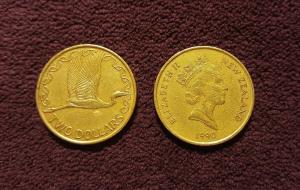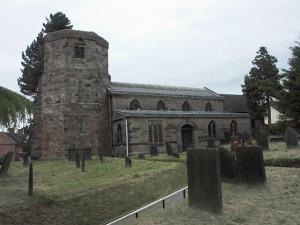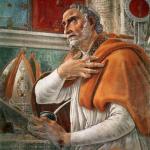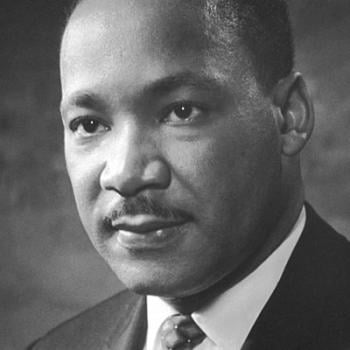
When I was about nine years old, a few years after having moved to the United States from England, I was at a meeting of AWANA. (AWANA is a fundamentalist imitation of Scouts and mostly consists of learning Bible verses, but that’s not important right now.) A girl at a table near mine was looking at a Canadian coin with her friends and I heard her exclaim, “Who is that girl?” I marched right over, looked at the coin, and announced loudly, “That, I’ll have you know, is Her Majesty Queen Elizabeth the Second, whose loyal subject I am.” (Or words to that effect.)
And no, this post isn’t about my limited social skills as a homeschooled nine-year-old, though much could be said about that.
Lost paradise
After a brief period of enthusiasm for my new home, I settled into a mood of nostalgia for the lost paradise of England that has never entirely left me. The image of the Queen on the coin became a symbol of my childhood memories–large shady trees in impossibly green fields, quiet cows, stone fences on the high moors, a red brick farmhouse with a large horse chestnut tree next to the driveway, rows of terraced houses lining city streets, an old village church with a rather strange-looking octagonal tower, the sound of the Staffordshire dialect, the feel of a crisp autumn morning after days of rain. We all have our Edens. This was mine.

My education and developing aesthetic sensibilities only deepened these attachments. I was homeschooled by my mother, who was educated in Britain in the 1950s. Shakespeare and Dickens and George Herbert and Wordsworth and Tennyson were staples. To this day I have never read some of the books that Americans take for granted as part of their education, such as The Catcher in the Rye. I read To Kill a Mockingbird for the first time at about 20–in Romania as it happens. But by the time I was about 14 I could rattle off long sections of Milton and Shakespeare and Wordsworth and Shelley.
Narnia and the Shire
Narnia–that apotheosis of a mythical medieval England–was one of the chief imaginative influences on me from the time I was about five. In my teens, Tolkien’s Shire joined it. (I read the Hobbit when I was very young but Lord of the Rings only at 15.) Tolkien too had his Eden in the English Midlands from which he was torn away too young. His was about fifty miles south of mine, on the edge of Birmingham as mine was on the edge of Stoke-on-Trent. (When I last visited Dilhorne, the village of my childhood, I was astounded at how close it was to the city, given my memories of it as a rural paradise forty years earlier. Tolkien’s Sarehole, to judge from the map, is more thoroughly engulfed, and Tolkien wrote about how the countryside he loved was already vanishing even in his own childhood more than a century ago.) In Lewis and Tolkien and Chesterton I found a confirmation of my feelings of nostalgic patriotism.
When, in my late 20s, I began rediscovering my father’s ancestral homeland of Shetland, I gained another set of powerful images to set beside the lush English farmland of my childhood: the hills of tufty grass and purple heather underneath a steely sky, ending in sudden cliffs over which birds wheeled and against which the great breakers of the Atlantic endlessly clashed. In Shetland I found a complex network of second and third cousins–the one place in the world where any given person I meet is likely to be able to explain to me exactly how we are related, even if we’re fourth cousins once removed. It truly is like the Shire. Peter Guy’s wonderful guidebook to walking the South Mainland of Shetland includes an anecdotal account of an argument the author had with a woman about picking mushrooms and the different customs on that subject on his own island of Yell as opposed to the South Mainland. One of my relatives on my grandfather’s side, also from the South Mainland, has remarked on how odd the folk from my grandmother’s island (Burra) are–this is an island roughly five miles from him as the crow flies, though longer by road.
So now I have two sets of memories and associations to bind me to my British heritage–the childhood imagery of the English Midlands and the ancestral associations, renewed in adulthood, of Shetland. Between them, these two landscapes and cultures encompass much of what makes Britain Britain. I have plenty of objections to the way in which the thing called the “United Kingdom” was forged, and I have considerable sympathy with the idea of Scottish independence. But my heart has roots in two very different parts of Britain, and my own sense of identity draws on both. And the queen on the coin stands for both.
What unity? Whose heritage?
The sober argument for the monarchy is that it functions symbolically as a source of unity and heritage that transcends politics. Does it work that way in practice? I don’t know. From where I sit, across the Atlantic, it looks rather like it. The very fact that the opposition party is called “His/Her Majesty’s Opposition,” and that leaders of both parties regularly consult with the monarch, seems to me to work against the sharp political polarization that is ripping the country of my residence apart. But many British people–including many of my own relatives, I think–would be much more dubious.
And against any such value we have to set the long list of negatives. Since the Queen’s death, the loudest and sharpest voices speaking against the wave of nostalgia and reverence that has swept through much of the Western media have come from people whose cultures were trampled on by British colonialism. The Queen’s death has been a much-needed, if to many of us unpleasant, occasion for accountability in this regard. Far too often those of us of British heritage console ourselves with the idea that British colonialism wasn’t quite as bad as some other kinds. It turns out that one reason this consoling paradigm has lasted so long is that the British government systematically sought to suppress evidence to the contrary.
Within Britain itself, many critics argue that the monarchy is an important linchpin of ongoing social inequality and the concentration of wealth. Apart from the monarchy’s own wealth, the sacred aura that clings to it provides cover for a class system in which land ownership and social and political privilege are still concentrated among a relatively few people. I’m not myself convinced that the monarchy is primarily to blame, given the different mechanisms by which a perhaps even greater level of social inequality and injustice has come to exist in the large republic to the West of the Atlantic in which I live. But it’s an argument that has to be taken seriously, for sure.
Poisonous mirage or tragic splendour?
The more fundamental question, I think, is whether the sentiments of “sacredness” which for some of us surround the monarchy have any positive value. Are such sentiments useless? Are they, in general (not just in the case of the British monarchy), primarily justifications for injustice and violence? (Girard’s sacred sacrificial order, say, or Marx’ “opiate.”) This of course affects other forms of sacredness as well, such as the Catholicism I embraced in adulthood after years of longing not unlike the longing that I felt for my lost childhood home. (The fundamental difference, of course, is that Catholicism isn’t my childhood religion.) Is it all a sort of poisonous mirage? Or can we make a case for some forms being healthier than others? (Catholicism over against nationalism, for instance.)
For many years I’ve responded to criticisms of the monarchy with the sentiments C. S. Lewis expressed in his 1943 essay “Equality.” Lewis argues there that equality is a form of “medicine” human beings need because of their tendency to dominate and abuse one another, but that “medicine is not food.” Lewis supports the relative political democracy he sees in the Britain of his day and calls for greater economic equality, while also celebrating the monarchy as an expression of a fundamental human craving for hierarchy.
Monarchy can easily be “debunked”, but watch the faces, mark well the accents of the debunkers. These are the men whose taproot in Eden has been cut — whom no rumor of the polyphony, the dance, can reach – men to whom pebbles laid in a row are more beautiful than an arch. Yet even if they desire mere equality they cannot reach it. Where men are forbidden to honor a king they honor millionaires, athletes, or film-stars instead — even famous prostitutes or gangsters. For spiritual nature, like bodily nature, will be served — deny it food and it will gobble poison.”
Living as I do in the United States, I have always found Lewis’ warnings about the substitutes for monarchy convincing. But of course one could respond that the British monarchy has essentially become a form of celebrity just as trivial as any other, and people who believe that the monarchy serves real injustice are unlikely to be impressed by being told that their “faces” and “accents” (an unfortunate term given the history of linking accent to class in Britain) show that they have un-Edenic, prosaic souls.
And Lewis, in this essay and elsewhere, uses the same arguments to defend gender hierarchy, something that I can see much more clearly (compared to monarchy) to be an active, malign force in the world I live in.
The key question, I think, is whether monarchy (and other forms of symbolic inequality) is a symbolic statement of the superiority of some people over others or of the dignity that inheres in all people. In another passage much quoted recently (from a letter to an American friend), Lewis reflects on the coronation of Queen Elizabeth, tellingly contrasting American and British reactions to the event:
You know, over here people did not get that fairy-tale feeling about the coronation. What impressed most who saw it was the fact that the Queen herself appeared to be quite overwhelmed by the sacramental side of it. Hence, in the spectators, a feeling of (one hardly knows how to describe it) — awe — pity — pathos — mystery.
The pressing of that huge, heavy crown on that small, young head becomes a sort of symbol of the situation of humanity itself: humanity called by God to be his vice-regent and high priest on earth, yet feeling so inadequate. As if he said, “In my inexorable love I shall lay upon the dust that you are glories and dangers and responsibilities beyond your understanding.”
Do you see what I mean? One has missed the whole point unless one feels that we have all been crowned and that coronation is somehow, if splendid, a tragic splendor.
I don’t have clear answers to the question of whether monarchy in general, and the British monarchy in particular, functions as an effective sign of the “tragic splendor” of the human condition. It does for me, certainly. But I am just one foolish, sentimental human being clinging to childhood memories. My own feeling that something would be lost if the monarchy were to be abolished is not of great importance in determining how a nation I have not lived in since I was six should order its public life.
But I do know that we all have our Edens. May our taproots grow long.
Title image by Brett Hondow from Pixabay.
Photo of All Saints, Dilhorne, © Copyright Jerry Evans and licensed for reuse under this Creative Commons Licence.












